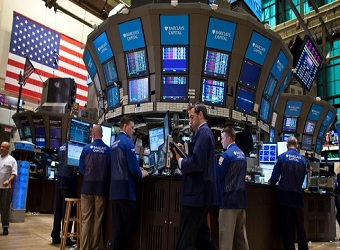U.S. stocks traded mostly lower on Monday as Wall Street geared up for a major week of earnings and Federal Reserve news.
The Dow Jones industrial average fell 51 points with Johnson & Johnson contributing the most losses. The S&P 500 traded 0.1 percent lower, with utilities leading decliners.
The Nasdaq composite outperformed, trading 0.2 percent higher and hitting a record high. The tech-heavy index is up nearly 20 percent year to date.
Approximately 180 S&P 500 components are scheduled to report, including tech giants Facebook, Amazon and Google-parent Alphabet.
“This is going to be a week where we really focus on earnings,” said Art Hogan, chief market strategist at Wunderlich Securities. “To the extent where we continue to have these-better-than-expected earnings and sales, the market will continue to move forward.”
Earnings season has gotten off to a strong start. As of Friday, 73 percent of S&P 500 companies that had reported beat earnings estimates and 77 percent topped sales estimates, according to data from FactSet.
Investors had high hopes for this earnings season, with S&P Capital IQ’s earnings growth forecast at 6.2 percent entering the season.
Earnings have been a tailwind for stocks recently, as the major U.S. stock indexes notched record highs.
“The SPX saw upside follow-through last week, making progress toward the measured move projection of 2507 derived from its latest breakout,” Katie Stockton, chief technical analyst at BTIG, said in a note.
Wall Street also got ready for the latest monetary policy announcement from the Federal Reserve. The central bank is largely expected to keep interest rates unchanged, having hiked in their previous meeting.
Market expectations for a rate hike were just 3.1 percent Monday, according to the CME Group’s FedWatch tool.
“The Fed is dragging its feet as rate hikes trail inflation’s trajectory. The problem is inflation trends are negative,” said Jack Ablin, chief investment officer at BMO Private Bank, in a note. “Loan demand is easing while loan standards are tightening. Lower monetary velocity dampens the inflationary effect of money printing.”
Investors also kept an eye on oil prices as officials from OPEC and non-OPEC countries met in Russia to discuss compliance of agreed production cuts and how to bring down inventory levels.
U.S. crude futures for September delivery rose 1.25 percent to trade at $46.34 a barrel.
In economic news, the IHS Markit Flash US Composite PMI hit its highest level in six months. IHS said in a release the growth in business activity was driven by “by a steeper increase in manufacturing production in July.”
Existing home sales fell 1.8 percent to a seasonally adjusted annual rate of 5.52 million units last month, more than expected.
Source: CNBC


